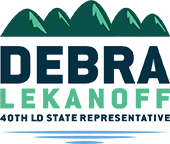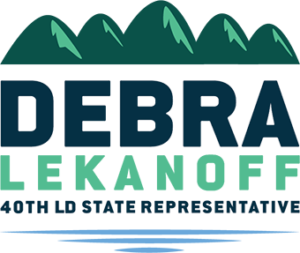Voting for the Future on Fantastic Friday
Dear Friends,
Last weekend, President Joe Biden announced on his social media pages that he will not be seeking re-election this November, leaving the Presidential election race and endorsing his Vice President, Kamala Harris, shortly after.
President Biden has been an incredible civil servant for more than 50 years in Washington, D.C., and we all owe him our gratitude for so many incredible accomplishments during his time in office – and in particular during his Presidential term.
Now, with a majority of delegates to the Democratic National Convention pledging their support to Vice President Harris, it is time to get excited about this new campaign!

Photo courtesy of PBS
It will be a long road to victory in November, but we are already seeing so many people rallying to support Vice President Harris as we fight to both continue the good work that has started these past four years, and prevent Donald Trump from another term in office.
If you are interested in supporting Vice President Harris as she campaigns for the Oval Office, there are a number of ways to get involved!
You can donate to her campaign here, directly supporting campaign efforts across the country.
You can volunteer in your state to support her campaign here, getting involved on the ground to help rally voters to her cause.
There is a newfound energy and excitement around the Presidential election, and I hope that Vice President Harris can count on your support!
Keep reading for more on this Fantastic Friday.
Rep. Debra Lekanoff
Celebrating Endorsements!
I am honored to have served the wonderful people of the 40th Legislative District for the past four terms. Today, I’d like to share with you the vision of an influential group in our community: the Riveters Collective.
The Riveters Collective is dedicated to discovering, developing, and promoting effective progressive civic action in Whatcom County and neighboring communities. Their vision is to create a diverse society of informed and empowered community members engaged in progressive political activism to improve the lives of all.

The Riveters Collective emphasizes the importance of self-reflection, critical dialogue, and awareness of the interconnectedness of systems, issues, and people. To this end, they submit an annually revised platform statement detailing both general and specific positions.
As your representative, I value the input and vision of groups like the Riveters Collective in shaping our community’s future. I remain committed to serving all constituents and working towards a more inclusive and prosperous district.
Next, I’m pleased to share with you my experience working with the Nooksack Tribe over the past two decades. This collaboration has significantly shaped my leadership foundation, preparing me to better serve our great state.
The Nooksack Tribe, with approximately 2,000 members, is rooted in their ancestral homeland in northwest Washington State. Their name, meaning “always bracken fern roots,” reflects their deep connection to the land and its resources.

The tribe continues to work towards a sustainable future for its members and the surrounding ecosystem. Their resilience and dedication to their heritage serve as an inspiration to all of us.
As your representative, I remain committed to supporting the Nooksack Tribe and other indigenous communities in our state, recognizing their vital role in Washington’s rich cultural tapestry and environmental stewardship.
Our People – One Washington – One Nation
Today I want to update you on our collaborative efforts across the 40th Legislative District and beyond. Our strength lies in our unity, and I’m proud of the partnerships we’ve forged over the years.
Over the past 35 years, my experience in public service has underscored the importance of working together across various levels of government. This theme of collaboration and unity is foundational to decision-making in our districts. The enduring partnerships between Skagit, Island, Snohomish, and Whatcom Counties, along with city and tribal police chiefs, exemplify our commitment to joint efforts in addressing community challenges, such as the fentanyl crisis. In my 2025 Legislative Priorities, we will focus on policies and fiscal investments to establish a State Drug Taskforce Agency. This initiative aims to unite our governing bodies to combat the drugs that are devastating our families, communities, and children’s futures.
I will work closely with the new Governor’s Executive Branch to invest in policies and support measures that build our workforce and strengthen protection laws for all citizens. The urgency of our work is clear, and I am committed to saving lives through a process that works for all communities.

Our efforts to address public safety challenges span across jurisdictional barriers, involving federal, state, local, and tribal governments. We continue to develop policies that recognize the sovereignty of tribal governments and the roles of local and federal authorities, as well as addressing the fiscal needs to implement these laws. In Whatcom County, ongoing efforts to break down barriers highlight the significance of building bridges and nurturing long-lasting relationships.
In the San Juan Islands, where access to services remains a challenge, the resilience shown in overcoming obstacles together speaks to the strength of long-standing relationships in governance. The island communities have established partnerships across local government agencies, faith-based organizations, and nonprofits, stretching from Whatcom and Skagit to Island County. These partnerships address unmet needs such as homelessness, shelters, childcare, and food security. By leveraging these deep-rooted connections, the islands not only care for their families and communities but also lead in advising elected officials on the value of collaboration when creating and implementing impactful policies, regulations, and investments.
Recognizing the vital role of tribal governments in our region, we have intensified collaboration with the Lummi Nation, Nooksack Tribe, Upper Skagit Tribe, Swinomish Tribe, Samish Tribe, Stillaguamish Tribe, and Tulalip Tribe across Skagit, Whatcom, and Snohomish Counties. These tribal governments, as stewards of their ancestral lands and cultures, have been integral partners in combating the fentanyl crisis, offering diverse services from wellness and recovery centers to affordable housing programs, and contributing through tribal charitable donations to support local nonprofits addressing unmet community needs. Embracing a collective approach that includes and respects the tribal perspective enriches our ability to provide governmental services effectively and make sound fiscal investments that benefit all residents.

The collaborative efforts between our legislative branch and tribal governments underscore a commitment to inclusivity and respect for diverse perspectives. As we navigate complex issues such as the fentanyl crisis, the participation of tribes in policy making and resource allocation ensures a holistic approach to addressing community challenges. By fostering strong relationships with tribal nations, we acknowledge their historical stewardship of the land and the importance of honoring their cultural heritage in decision-making processes.
In addition to combating immediate crises, our partnerships with tribal governments pave the way for sustainable, long-term solutions that prioritize the well-being of all residents. Through joint initiatives aimed at improving access to crucial services and investing in community development, we strengthen the fabric of our society and create a more resilient and inclusive future for generations to come.
As we strive to build a more cohesive and supportive community, we must continue to uphold the values of collaboration, unity, and mutual respect. By working together with tribal governments and other governing bodies, we can leverage our collective strengths to address complex challenges, promote equity, and foster a sense of belonging for all members of our diverse district. The enduring relationships we cultivate today will lay the foundation for a more prosperous and harmonious tomorrow, where the voices and needs of all individuals are heard and valued.
Thank you for your continued support and engagement in our community’s progress.
Saving Salmon Requires Collaboration
I wanted to share with you some highlights of my work over the past six years in the legislature regarding salmon recovery and protection. With over 30 years of experience working at the state, regional, and national levels, I remain deeply committed to the future of salmon in Washington State.
As the sole Indigenous legislator in Washington, my advocacy for salmon conservation is not just a political stance, but a personal and cultural commitment. I view salmon as more than just a species – they are a symbol of interconnectedness and sustainability, vital to our ecosystems, cultural traditions, and community well-being.

My efforts have focused on bringing diverse voices together to address the complex challenges facing salmon populations. I’ve worked to overcome legislative hurdles and push for comprehensive action on habitat conservation and restoration. While we’ve made some progress, such as investments in restoring state highway culverts for salmon passage, the failure of key bills like HB 1117 and HB 1838 highlights the obstacles we still face.
Looking ahead, I’m committed to making salmon restoration a top priority in policy and budgeting decisions. This requires generational commitments and collaboration among various stakeholders. I’ve advocated for innovative approaches, including recommendations from Senator Patty Murray and Governor Jay Inslee for comprehensive solutions in the Columbia River Basin.

Key priorities include securing funding for habitat restoration, addressing backlog recovery efforts, and exploring solutions such as dam breaching to mitigate extinction risks. By weaving salmon revitalization into all aspects of our legislative and policy considerations, we can work towards a more sustainable future.
The stakes are high – salmon extinction would not only devastate our ecosystem but also profoundly impact Native American culture, laws, and values. As your representative, I will continue to champion a unified approach towards salmon conservation, inviting all of you to join in this crucial effort.
Together, we can create a future where salmon thrive, our ecosystems flourish, and our cultural traditions endure. Thank you for your support in this vital mission.
Salmon on the Skagit River
In my morning call today with the Upper Skagit Tribe, Scott Schuyler and their tribal council shared their invaluable teachings on governance between state and local government. Over the years, I have deeply engaged with the salmon crisis on the Skagit River, which remains at the forefront of my work. This crisis is not just about fish; it is about preserving our cultural heritage and fulfilling our treaty rights.
The salmon population in the Skagit River has been drastically impacted by the construction of the Gorge Dam, which has blocked vital stretches of salmon habitat and disrupted the natural flow of the river. This has led to significant declines in salmon numbers, affecting the ecosystem and the Upper Skagit Tribe’s way of life. The dam’s presence in sacred areas, known as the “Valley of the Spirits,” without consultation, adds to the cultural trauma endured by the tribe.

Skagit River
Through years of learning and advocacy, I understand the delicate balance we must achieve between combating climate change and restoring salmon populations. Reducing carbon emissions, transitioning to renewable energy sources, and removing dams are crucial steps in this process. The Upper Skagit Tribe’s efforts, led by Scott Schuyler, include pushing for the removal of the Gorge Dam and conducting thorough assessments to mitigate the long-standing harms to the river and the tribe
This ongoing fight for salmon is not only about environmental conservation but also about cultural survival and justice for the Upper Skagit people. By working together, we can ensure a future where the Skagit River flows freely, supporting both the salmon and the tribal communities that depend on it.
Addressing the Unhoused Crisis in the Region
I want to update you on recent developments regarding homelessness and housing policies in our region and beyond.
Governor Gavin Newsom of California recently issued an executive order directing state agencies to clear homeless encampments from major urban centers. This action follows a Supreme Court decision that allows states and cities to enforce bans on public sleeping, overturning previous restrictions. California faces a severe homelessness crisis, with over 27% of the country’s homeless population despite having less than 12% of the overall population. The order aims to address safety concerns and health risks associated with encampments lacking basic amenities.
While some local officials support the initiative, homeless advocacy groups argue it doesn’t address underlying issues. San Francisco and Los Angeles mayors have announced plans to clear encampments, with varying approaches to enforcement and support services.
In contrast, here in Washington State, we’ve taken a different approach. Our legislature has implemented robust housing policies and strategic investments to address our housing crisis. Our Housing Strategy focuses on increasing housing supply, preserving affordable housing, preventing homelessness, and supporting vulnerable populations. We’ve initiated rapid rehousing programs, supportive services, and tenant protections.
Despite our progress, we recognize that significant challenges remain. We’ve issued an urgent call for communities to address zoning codes and engage local governments in housing provision. Our goal is to create a more inclusive and equitable housing landscape for all Washington residents.
Both California and Washington acknowledge the need for multifaceted approaches that combine enforcement measures with assistance strategies to address homelessness effectively. However, our current strategies differ in focus and implementation.
As your representative, I remain committed to finding sustainable solutions to our housing and homelessness challenges. We will continue to work towards creating a just and equitable housing system that meets the needs of all our residents.



